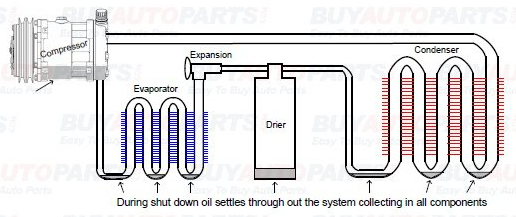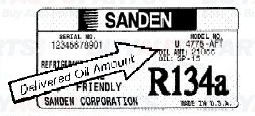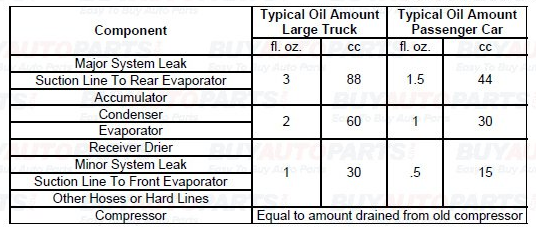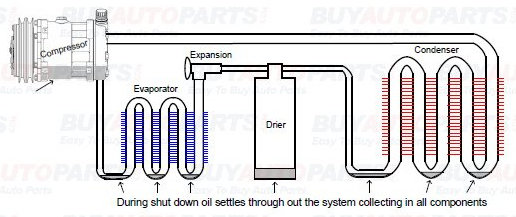Oil is as important as the refrigerant in an AC system. The refrigerant is subjected to extreme pressure changes which generates a lot of heat, in addition to the heat produced by the AC parts themselves. The oil absorbs this heat and keeps the AC components lubricated. The amount of oil should neither be lesser nor greater than the required amount. In either case, the performance of the AC system will be affected. This page discusses the importance of oil levels in the AC system and explains how to determine the right quantity of oil for your system.
While installing a new compressor or any other parts in your AC system, it is imperative that you add the correct amount of oil. Adding the right amount of oil to the AC system is just as crucial as fitting quality replacement parts in your vehicle. The oil circulates along with the refrigerant when the AC is running. When the AC is turned off, the oil will settle within the components of the AC system, such as the evaporator and the suction lines. If you add too much oil to the system, it may pool in various places of the system and can coat the inner walls of the evaporator and condenser coils. This will diminish their ability to absorb or dissipate heat, thereby bringing down the overall cooling performance.

There are a few different ways to find out how much oil needs to be filled into the AC system.
- The first place to look is on the tag of the AC compressor. It will tell you exactly how much oil you need to add to the system.
- If you cannot find the information on the compressor, you can always visit our website, and view our Reference Guide in our How To section (just click the link to be taken to the correct page).
- However, the easiest way to tell EXACTLY how much oil needs to be in your specific AC compressor is to drain the old compressor and measure the amount of oil that comes out. All you need to do is fill the new AC compressor with exactly the same amount that you drained out of the old AC compressor.


If adding the right amount of oil into your compressor is mandatory, choosing the right type of oil that best suits your system is also important. Use your owner's manual to find the oil that will be compatible with your system. Be sure to also choose a quality oil from an authentic supplier. Pouring oil from a compressor installed in one vehicle into another is definitely not recommended. Check for the specifications, right amount and type of oil, before attempting any DIY practices.
Once you add the right amount of oil to the AC system, maintaining the same amount in the future is also vital for an efficient performance of the AC mechanism. Check for the optimal level of AC oil at the intervals specified in your owner's manual. A failure to do so can result in oil starvation, which can be detrimental to the entire system.
Note: Remember that releasing refrigerant into the atmosphere is against the law. While adding oil to an AC compressor, you must first evacuate the system with a recovery machine. This captures the refrigerant and does not allow it to escape into the atmosphere. Please note that this is not an official installation or instructional guide. BuyAutoParts.com is not responsible for any damage or injury that can occur during these procedures. We always recommend that you have your AC system serviced by a licensed mechanic.


